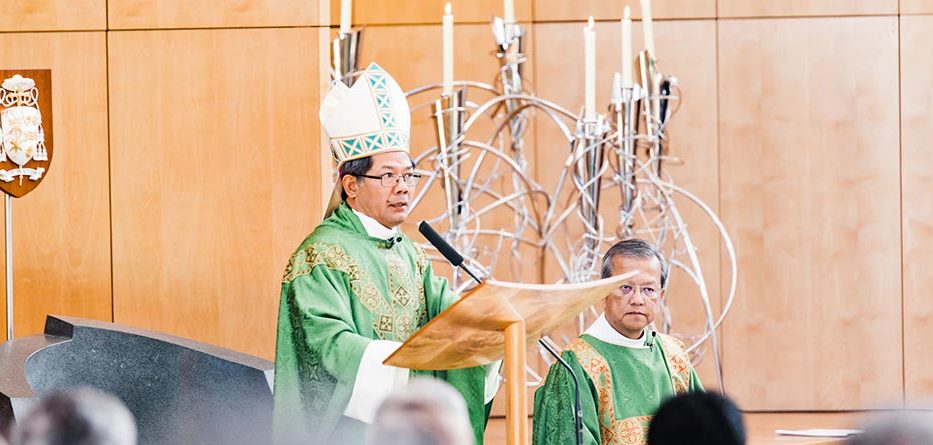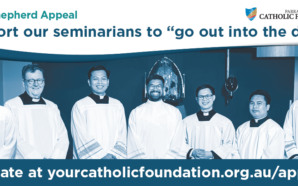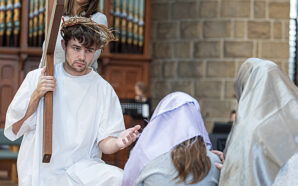Most Reverend Vincent Long Van Nguyen OFM Conv DD STL, Bishop of Parramatta
Homily of the 29th Sunday in Ordinary Time in Year A 2017 at St Patrick’s Cathedral, Parramatta
22 October 2017
Dear friends,
One of the deepest strands in the biblical tradition is the desire of the Jewish people to be an alternative society to the oppressive domination systems. These systems were designed by empires to enslave their subjects via forced labour, tributes, taxes and other means of exploitation. The people of God – being a small nation – had a fair share of exploitation. Their experience of empire domination – from Egypt to Assyria, from Babylon to Rome – fed into a radically countercultural vision. Therefore, in contrast to the gods of the empire, who serve the will of the king, the Hebrews worshiped Yahweh, who they understood to be free, the critic of kings, and the advocate of vulnerable, oppressed people.
Today’s liturgy of the Word is set in this context of the long history of oppression of the Jews and their indomitable desire to be an alternative society under God’s rule. In contrast to the harsh social reality of the empire, God’s people are called to be a community of hospitality, compassion and neighbourliness.
In the first reading, the prophet Isaiah speaks of God’s rather surprising and unexpected way. After decades of exile in Babylon, the people would be able to return to their homeland thanks to an unlikely hero, Cyrus – not Miley Cyrus – but Cyrus, the king of Persia. He had defeated the terrible Babylonians, who destroyed Judah, the temple and most of all, banished the Israelites into captivity. Isaiah refers to Cyrus as God’s “shepherd” and, even, God’s “anointed one”. It is an extraordinary acknowledgement of a foreign ruler. God indeed could use an unlikely instrument to bring about his plan for the people.
The message of the prophet, however, does not stop with the benign king of Persia and his policy of repatriation. The returned exiles are to form a renewed community of faith in their homeland. It was not to be business as usual or as before the exile, that is, with the corrupt system of the Jewish monarchy. In the exile, the biggest lesson they learned was seeking God’s justice for the poor and the lowly. They learned to be a society in which the care of the most marginalised was to be the essential distinguishing feature. Hence, as they regroup in their homeland, they are to put that lesson into practise. And in doing so, they continue to be a contrast society in relation to empire.
In the Gospel, Jesus faces the tricky question of whether or not he should pay taxes to Caesar. In the context of the Roman oppression, it was a sensitive political issue which divided Jews, not unlike such contemporary issues as same-sex marriage or assisted dying etc. He could be seen as a zealot who rebels against Roman rule or a traitor who cooperates with the oppressor. Either way, it was a real trap.
Jesus’ response was quite ambiguous at face value. “Give back to Caesar what belongs to Caesar and to God what belongs to God”. However, when we unpack this response in the light of his ministry, we can appreciate the depth of its significance. To the Jews, nothing belongs to Caesar or the Roman empire or any empire. Empires had no power and authority over the land and its people. By taking taxes and tributes, Caesar usurped God’s sovereignty because everything belonged to God. Jesus thus reasserted the deep belief that Caesar has no claim on the Israelite people, since God is their actual ruler. Furthermore, by proclaiming the Kingdom Vision of humble service, compassion and solidarity with the marginalised and the oppressed, he rejected the imperial version of ruthless exploitation, monopoly and oppression.
Brothers and sisters,
The Word of God today shows us that faith has a social and political dimension. We cannot live our faith to the full without embracing the challenge of the contrast society that our Jewish forebears attested to and the Kingdom Vision that Jesus proclaimed by his words and deeds. The early Christians understood the significance of being fundamentally countercultural in how they lived, how they related, how they shared resources and how they showed the characteristics of an alternative society. In the second reading, Paul thanks God for the Christians in Thessalonica for their faith in action. They have turned to God from idols and embraced a life of faith, hope and love in contrast to their pagan counterparts.
As followers of Jesus, we too need to demonstrate our being countercultural, not by adopting a fortress and fearful attitude but by showing a kinder, more inclusive, more caring alternative society under God’s rule. Christians today must respond to imperial ideologies which manifest in hate, discrimination, fear, oppression, power, violence, exploitation, cruelty etc. We must have the courage to be a community of hospitality, compassion and neighbourliness that serves as an alternative to the kingdom of Caesar. Let us pray even as we enact liturgically the Kingdom Vision of Jesus in our Sunday Eucharist that we may be able to live up to that calling.








